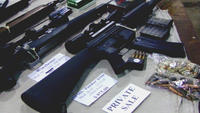-
Illinois expected to change law to allow carrying concealed guns
Illinois is the last state in the union that has a complete ban on carrying concealed weapons. Judge Richard Posner of the 7th Circuit Court of Appeals ruled that the current ban on concealed carry is unconstitutional and said some authorization of citizen concealed carry is long overdue.
-
-
Israel, again, beats Syria’s air defense systems

The Tuesday night Israeli air attacks against targets in Syria raise questions about the effectiveness of the vaunted Syrian air defense system. By extension, similar questions should be asked about the effectiveness of the Iranian air-defense system: both systems use similar technology, and both come from Russia.
-
-
Contours of Hill gun debate emerge
Two issues have emerged as central to the debate over post-Sandy Hook gun control legislation: the first is banning the sale of assault weapons and limiting the size of magazines, the second is requiring a universal background check to make sure those who buy guns are responsible and stable enough to handle them. Hill observers say that a bill requiring universal background check, if carefully drafted to address the concerns of those who live in rural areas, may pass, as would legislation to limit the size of magazines. Banning the sale of assault weapons may be more difficult.
-
-
Tight money hampers Detroit police
A non-profit data sharing consortium approached the Detroit Police Department last summer to see whether the department would like to join the consortium’s regional system and share technology that would allow the department effectively to put hundreds of officer back on to the streets. Joining the Courts and Law Enforcement Management Information System (CLEMIS) would have cost the city $1.2 million a year, which the city says it cannot afford.
-
-
Georgia police gets military-grade weapons
Metro Atlanta police departments and sheriff’s offices have recently acquired some new toys which include armored trucks, grenade launchers, and personnel carriers. According to the Georgia Department of Public Safety, $200 million in military equipment and weapons are owned by 600 Georgia law enforcement agencies. This military grade equipment has some people concerned as to why local law enforcement agencies are so heavily armed.
-
-
Israel’s attacks in Syria indicate Assad’s deteriorating position
Wednesday’s attacks are likely to be the first in a series of attacks which Israel will feel compelled to launch at an ever quickening pace as the Assad regime continues to disintegrate. Israel attacked targets inside Syria before, but not too often, and only when the targets were of strategic value. The deteriorating situation in Syria appears to have persuaded Israel that it has no choice but to renew its military operations inside Syria.
-
-
Pentagon to bolster U.S cyberwar capabilities
The Department of Defense is planning an expansion of the U.S. Cyber Command, and the Pentagon plans on recruiting thousands of code crackers, online security professionals, and hackers in order to assemble the nation’s largest cyber army ever.
-
-
Google wants to limit law enforcement’s access to e-mails, users’ information
In 2012 Google received 16,407 requests for user data, which affected 31,072 users or accounts. More than half of the requests were accompanied with a subpoena, the others were not. Google is planning on lobbying Washington this year to persuade lawmakers that they should make it harder for law enforcement to gain access to e-mails and other digital messages.
-
-
New Hampshire bill would limit searches, expand expectation of privacy

New Hampshire State Representative Neal Kurk ® says state residents do not expect,when they throw something out in their trash or leave a drinking glass with their saliva on it at a public place, that law enforcement, insurance companies, or data miners would use the trash left behind to glean personally identifiable information.
-
-
Majority of Americans -- gun owners and non-gun-owners -- support stronger gun laws

Gun violence claims 31,000 U.S. lives each year in the United States, and the rate of firearms homicides in America is twenty times higher than it is in other economically advanced nations. A new national public opinion survey conducted by researchers at the Johns Hopkins Bloomberg School of Public Health found that the majority of Americans support a broad array of policies to reduce gun violence. For many policies, there was little difference in support between gun owners and non-gun-owners.
-
-
Twitter’s information policy frustrates police, delights customers
Twitter’s robust approach to customers’ privacy has caused consternation among law enforcement agencies, who say that Twitter’s refusal to hand over information on users of the service, except in rare cases, has frustrated criminal investigations. Twitter’s user, though, appreciate the company’s scruples.
-
-
Military electronic devices disappear into the surroundings after use

Electronic devices have become necessary for military operations, but it is almost impossible to track and recover every device. At the end of operations, these devices are often found scattered across the battlefield and might be captured by the enemy and repurposed or studied to compromise DoD’s strategic technological advantage. New DARPA program — Vanishing Programmable Resources (VAPR) program — seeks transient electronics, that is, devices which would maintain the current functionality and ruggedness of conventional electronics, but, when triggered, be able to degrade partially or completely into their surroundings.
-
-
Biometric workshop studied voice, dental, oral standards
The National Institute of Standards and Technology (NIST) hosted a workshop to discuss proposed supplements to the biometric data format standard that support voice recognition, dental and oral data, disaster victim identification, and special data needs for mobile ID applications.
-
-
U.S. to build drone base in Niger

With the war in Mali raging, the U.S. Africa Command is now establishing a drone base in northwest Africa in order to bolster U.S. surveillance – and operational — capabilities against Islamist groups in the region. Initially, the drones flying from the base will conduct unarmed surveillance missions, but there is little doubt that if targets present themselves, these drones will be equipped with missiles and go on hunting-killing missions.
-
-
Laser scanner documents crimes scenes quickly, accurately
The Carlsbad, California police is using a new laser scanner to capture what happened at crime scene. Thenew technology cuts the time it takes to document a crime scene, from the size of the room to the bullet holes in the wall, by up to 80 percent.
-
More headlines
The long view
Tantalizing Method to Study Cyberdeterrence
Tantalus is unlike most war games because it is experimental instead of experiential — the immersive game differs by overlapping scientific rigor and quantitative assessment methods with the experimental sciences, and experimental war gaming provides insightful data for real-world cyberattacks.
Using Drone Swarms to Fight Forest Fires
Forest fires are becoming increasingly catastrophic across the world, accelerated by climate change. Researchers are using multiple swarms of drones to tackle natural disasters like forest fires.
Testing Cutting-Edge Counter-Drone Technology
Drones have many positive applications, bad actors can use them for nefarious purposes. Two recent field demonstrations brought government, academia, and industry together to evaluate innovative counter-unmanned aircraft systems.
European Arms Imports Nearly Double, U.S. and French Exports Rise, and Russian Exports Fall Sharply
States in Europe almost doubled their imports of major arms (+94 per cent) between 2014–18 and 2019–23. The United States increased its arms exports by 17 per cent between 2014–18 and 2019–23, while Russia’s arms exports halved. Russia was for the first time the third largest arms exporter, falling just behind France.
How Climate Change Will Affect Conflict and U.S. Military Operations
“People talk about climate change as a threat multiplier,” said Karen Sudkamp, an associate director of the Infrastructure, Immigration, and Security Operations Program within the RAND Homeland Security Research Division. “But at what point do we need to start talking about the threat multiplier actually becoming a significant threat all its own?”
The Tech Apocalypse Panic is Driven by AI Boosters, Military Tacticians, and Movies
From popular films like a War Games or The Terminator to a U.S. State Department-commissioned report on the security risk of weaponized AI, there has been a tremendous amount of hand wringing and nervousness about how so-called artificial intelligence might end up destroying the world. There is one easy way to avoid a lot of this and prevent a self-inflicted doomsday: don’t give computers the capability to launch devastating weapons.
